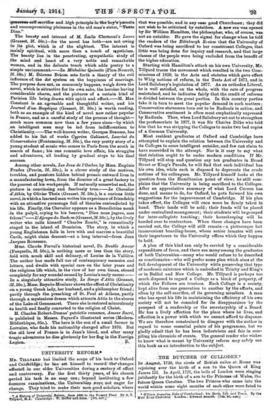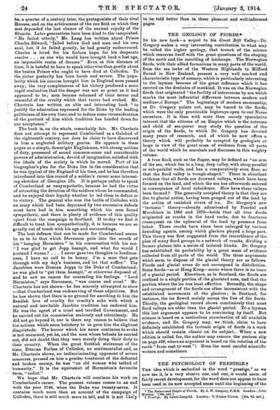-.TIM BUTCHER OF OULLODEN.!, Itr.A.uppast„ 1720, the cirole of British
exiles atitome was rejoicing ever the birth, of a eon to his Queen of Ring James III. In April, 1721, the bells of London were,ringing jubilantly for the birth of a son to the Princess- of Wales, the future Queen Caroline. The two Princes who came into the world within some eight months of each.otber, were fated to • William Attputn, ita.of entberant: indsr4, fAf. Ind times. By the tad,. Entrenntnitv •Loadou, Entord latteltit •inte.4d.n1 be, a quarter, of a..century later, the protagonists of their rival Houses, and on the arbitrament of the one field on which they met depended the last chance of the ancient royalty of the Stuarts. Lateegenerations have been kind tothe vanquished. " He failed utterly," Mr. Lang hae writbm .alaout Prince Charles Edward, "failed before God and man and his own soul, but, if he failed greatly, he had greatly endeayoured. -Charles is loved for his forlorn hope, for hie desperate• resolve . . . as one who would have brought back a lost age, .an- impossible realm of dreams." - Even at this distance of ;time, it is hateful to have to speek otherwise than gently about the beaten Prince who ought to have died at Culloden. To the victor posterity has been harsh and severe. The popu- larity which his success brought Lim. in England soon passed away; the very completeness of his victory produced a more rapid realization that the danger was not so great as it had appeared to be; men became ashamed of their terror and resentful of the cruelty which that terror bad evoked. Mr. Charterie has written an able and interesting hook "to justify the admiration expressed for the Duke by the leading politicians of his own time, and to induce some reconsideration of the portrait of him which tradition has banded down for our acceptance."
The book is, on the whole, remarkably fair. Mr. Charteris does not attempt to represent Cumberland as a Galahad of the eighteenth century, nor does he claim to have discovered in him a neglected military genius. He appears in these pages as a simple, downright Englishman, with strong notions of duty, possessed of sound common-sense and considerable powers of administration, devoid of imagination, satisfied with the ideals of the society in which he moved. Part of his biographer's plea for the Duke lies in the consideration that he was typical of the England of his time, and he has therefore introduced into this record of a soldier's career some interest- ing sketches of Georgian life. It is perhaps unfair to speak Of Cumberland as *nsympathetic, because he had the virtue of attracting the devotion of the soldiers whom he commanded, and he enjoyed their loyalty whether he led them to defeat or to victory. The general who won the battle of Culloden with an army which had been depressed by two successive defeats must have bad in him something which his men found sympathetic, and there is plenty of evidence of this quality apart from the campaign in Scotland. If to-day we find it difficult to treat Lim sympathetically, it is because we are so greatly out of touch with his age and surroundings.
The beet defence that can be made for Cumberland seems to us to be that which Stevenson puts into the mouth of his "hanging Hermieton" in his conversation with his son. '1 was glad to get Jopp haangit, and what for would I pretend I wasna ? . . . I never gave twa thoughts to heedious- nese, I have no call to be bonny. I'm a man that gets through with my day's business, and let that suffice." The Jacobites were Duncan Joppa to the Duke of Cumberland; be was glad to "get them haangit," or otherwise disposed of, and he saw no reason for concealing his feelings. "Lord Hermiston," says Stevenson, "was coarse and cruel." Mr. Charteris has not shown—he has scarcely attempted to show —that Cumberland was undeserving of these adjectives. But he has shown that there is no ground for ascribing to him the fiendish love of cruelty for cruelty's sake with which a natural and inevitable Jacobite tradition has endowed him. He was the agent of a cruel and terrified Government, and he carried out his commission zealously and relentlessly. He did not go beyond it, nor is there any reason to believe that the actions which seem butchery to us gave him the slightest disquietude. The horror which his name continues to evoke is not unearned, yet he, and the men whose behests he carried out, did not doubt that they ware merely doing their duty to their country. When the great Scottish statesman of the time, Duncan Forties of Culloden, no sentimentalist and, as Mr. Charteris shows, no indiscriminating opponent of severe measures, Pressed on hint a gentler treatment of the defeated and broken enemy,- he was "an old woman who talked of humanity." It is the equivalent of Hermiston's favourite term, " eediot." • ' We hope that. Mr. Charterie will continue.his work on Cumberland's career; The present volume comes to ex end with the year 1748, when the Duke was twenty-seven. It contains much More than an account of the campaign of Culloden, there is still much more to tell, and it is not likely
to be teld better than in these pleasant and well-informed pages.



















































 Previous page
Previous page